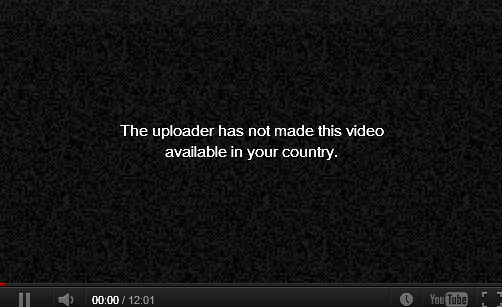There are shows that are so damn good out there that make me want to slap on an eye patch, glue a parrot to my shoulder, and gurgle “Arrrrr” all the way through a BitTorrent client. The Game of Thrones, the Walking Dead, Breaking Bad, Sherlock, and Hell of Wheels are the top shows I can immediately think of. These shows are incredibly high quality and worth paying for.

Alas they are distributed in an unfriendly manner in Australia. Some are not available, others are shown in Pay channels only, populated with ads and still broadcast at unfriendly times. The Walking Dead is shown on a pay tv service, with ads, at times which are probably appropriate for its rating but still frustrating.
Even the previews and community information sites which banter about these shows are often blocked, which leaves me feeling like a second class consumer.
Of these TV shows I’ve seen smatterings of some, and a fair proportion of others – via a range of mediums, be that purchased dvds, borrowed media, downloads, and some such. Some were even free to air (actually free) and at almost consistent times during a schedule. Sometimes I get to watch the preview teaser and that’s about it. I’m not sure that some of the shows will ever be on free-to-air TV in Australia at all, which is why Aussies get used to either streaming content, or more often using a Pay TV service or the DVDs.
There are any number of website blogs/posts talking about how it’s fair and reasonable to pirate content because it takes too long to get to Australia, or that the distribution network is unfriendly, or not high bandwidth enough. I feel that pain too.
But it struck home today after flipping through the comments on a Walking Dead page just how much rubbish those points of criticism are. The fact is that these shows are awesome and I mirror some of the attitudes of the “pirate customers” where the range of barriers frustrates me too much.
In spite of that the distributors creators are:
- not silly to wish to be paid for their content,
- not at all likely to be paid by me for the content if it requires a subscription to a wider service per month (i.e. no way in hell I’ll pay Foxtel just to watch 2x TV shows),
- focusing on the “low hanging fruit” who already have pay to view subscriptions,
- likely to be unwilling to show on free-to-air as the ad revenue alone may not be enough,
- unable to compete with the BitTorrent providers who will steal the content regardless of how free, fast, or packaged it is. Zero cost in a range of formats, with no ads, within 8 hours of the USA viewing is better than any Australian distribution channel can offer.
So I get why the Distributors are not interesting in changing, and also why the file-sharers will not stop stealing content. Two aspects of a problem, where one is clearly frustrated and also clearly illegal. The general rule for Australia is that the shows are unavailable in a timely manner after release in the USA, even when that option costs a very large amount of money.
This creates a huge divide between the two views, more of a polarity: those who pay and those who steal.
That said, there has to be a way for the distributors to get some of the money that the people in the middle would give them, if a channel which was not wasteful and expensive existed. Apple’s iTunes is one for Game of Thrones where a digital copy was allowed, and each episode was paid for separately. That is a reasonable option, is quick and current, although it still seemed too expensive to my taste.
So what would I pay? Approx $2-4 per episode. Yes I know that is cheap, and here is why.
I measure the cost of the service, entertainment, or experience against what else it can provide. A season of a show runs approx 13 episodes which gives a rather skimpy revenue stream of $26 to $52; or as I like to think of it a DVD season of a show. It could also be measured up against a good bottle of wine.
Also a single episode of a TV show is not worth a lot by itself, or out of order. That means that to create a valued product the offering would need to incorporate several shows, offering a bundle of content with flexibility. Then allow me to stream/downland that content in a timely way after the USA release and I’m happy.
Something like a AMC+HBO-Australia, where I can pick a few shows and get them all. I’d be really happy, and especially happy as I would not need to install a shitty Foxtel-like box in the house, and also can have flexibility to view it everywhere I wish. That is a product with appeal downunder. Do you think HBO or AMC would be happy to take $100 to $200+ per year from me direct into their coffers? Yes, I think they’d be keen. And I’ll happy give it to them if they can get on-board with a better global distribution model.
Happy viewing.
PS – It is ever stranger to me that the folks who locally “print” the DVD and BluRays download a master of the show, and then burn them for sale in stores. If the distribution networks are good enough to do that, then they can mock-up or use an existing distribution system to get content out to the masses via selective subscription.
Yes, that will slow down the DVD sales, but the pirates were never those customers, and the DVDs charge a heck of a lot for material which is just pointless to me as a viewer (packaging, freight, dvd extras, branding, etc).
 RSS Feed
RSS Feed

 The creators have answered all the obvious questions (many platforms, moderate compatibility, DRM and free, and offline/online) in reasonable and commercial ways. It has a robust FAQ and help area, provides a sample interface for what the app is like, and is well designed.
The creators have answered all the obvious questions (many platforms, moderate compatibility, DRM and free, and offline/online) in reasonable and commercial ways. It has a robust FAQ and help area, provides a sample interface for what the app is like, and is well designed.
